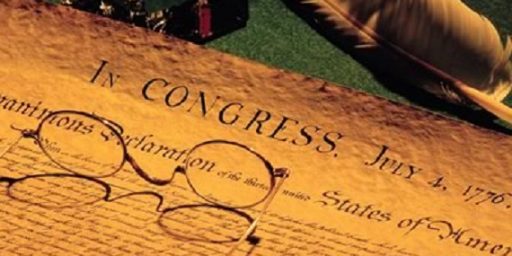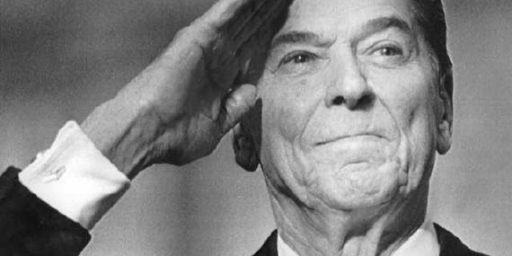Understanding the Founding Documents (Declaration Edition), Part II
Revisiting the application of the Declaration.
 In response to my previous post, Don Surber updates his with the following:
In response to my previous post, Don Surber updates his with the following:
UPDATE: Steven Taylor of Outside the Beltway asserts that Thomas Jefferson would limit a change in governments to open rebellions. That would limit to the Civil War attempts to change our government. I assert that Jefferson would have recognized the Reagan Revolution for what it is.
Actually, I didn’t assert anything of the sort. I noted that the passage that Surber was using to criticize the electorate for voting for Carter in 1976 and Obama in 2008 had no proper application to such events, but was about revolutionary changes. The passage is as follows, with the sentence Suber used highlighted:
That whenever any Form of Government becomes destructive of these ends, it is the Right of the People to alter or to abolish it, and to institute new Government, laying its foundation on such principles and organizing its powers in such form, as to them shall seem most likely to effect their Safety and Happiness. Prudence, indeed, will dictate that Governments long established should not be changed for light and transient causes; and accordingly all experience hath shewn that mankind are more disposed to suffer, while evils are sufferable than to right themselves by abolishing the forms to which they are accustomed.
Perhaps I am mistaken, but I don’t think that the meaning of the above, especially when placed in the full context of the Declaration is all that difficult to understand.
Further, I would argue that Surber’s statement above really further makes my argument, as the whole point in that post is that Surber appears to misunderstand the purpose, argument, and philosophy behind the Declaration and further confounds the situation via a vague application of the word “change” and even then doubles down with a Reagan Revolution references.
First, the entire philosophical underpinning, not to mention the plain text itself, of the Declaration of Independence is about justifying the replacement of an existing governmental structure and replacing it with a new one (not just changing administrations or instituting new public policies). Building any argument that attempts to utilize the text of the document needs to acknowledge that fact, especially when one uses a quotation that is explicitly about that type of change.
Second, I am not even sure at this point what Surber means by “change.” I would agree that Jefferson would have allowed for other types of change to occur by means other than armed rebellion. However, that’s not what he was talking about in the Declaration. Again, see the above point. As such, I am not sure why he would assert that I asserted “that Thomas Jefferson would limit change in government to open rebellions.” No, I am saying that the text that Surber uses in his post is explicitly about revolutionary change and really can’t be used in any other manner to make any other argument.
Third, I am not even sure what Surber means by the “Reagan Revolution” exactly as the term is really more of a slogan (like the “Republican Revolution” of 1994) used simply to describe a specific set of political successes rather than a coherent, radical change in the way government works. Reagan cut taxes, yes. Reagan championed a strong national defense, yes. The degree to which this constitutes revolutionary policy changes is problematic to be kind. (As a side note, I must confess the insertion of Reagan into the conversation strikes me as a non sequitur. The reference seemed to come out of nowhere).
I will refrain from speculating as to exactly what Jefferson might or might not have though about Reagan, save to say that, again, the philosophical and political arguments of the Declaration provide no guidance as to evaluating the regular passage of power from one elected administration to the next or to their policy choices (or even to substantial reforms of government).
Again, I am a big proponent of the notion that if one is going to deploy the founding documents, one needs to deploy them properly. The Declaration of Independence is useful to establish the basic America creed to which we aspire (“We hold these truths to be self-evident, that all men are created equal..”) and our general belief in popular sovereignty (i.e., that governments govern by the consent of the governed). However, you can’t use the Declaration to logically critique specific electoral outcomes (such as Surber does with 1976 and 2008) or, for that matter, to praise Reagan.
In the most simple terms: if Surber wants to argue that 1976 and 2008 are tragedies, fine. If he wants to extol Reagan, be my guest. However, the passage he is using from the Declaration to do so is inapplicable to the arguments (or, really, assertions for the most part) that he wants to make.






This makes me wonder if, to a certain flavor of conservative, the Reagan Revolution is more than a metaphor. It’s possible that some people think that Reagan effected a kind of constitutional change, one which permanently limited the scope of acceptable policy outcomes so as to preclude the things Democrats and liberals wish to do with the federal government. This would explain the bubbling rage that is exhibited by calls for “Second Amendment solutions” and Surber’s barely-veiled insinuation that if Obama is not removed at the ballot box, that there are other ways.
@Dr. Taylor – to a certain segment of our population Reagan is like bacon – fantastic on anything.